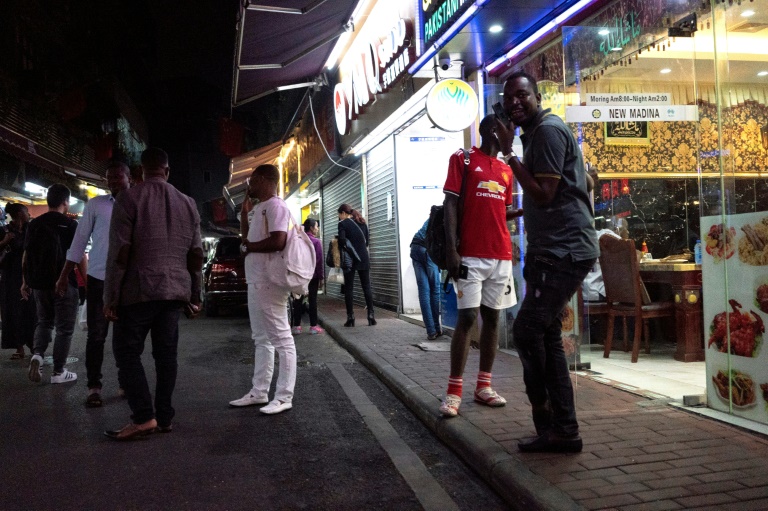Africans in southern China’s largest city say they have become targets of suspicion and subjected to forced evictions, arbitrary quarantine and mass coronavirus tests as the country steps up its fight against imported infections.
China says it has largely curbed its COVID-19 epidemic, but a recent cluster of Nigerian community-related cases in Guangzhou has sparked alleged discrimination by locals and virus prevention officials.
Local authorities at the industrial center of 15 million people said that at least eight people diagnosed with the disease had spent time in the Yuexiu district, known as “Little Africa”.
Five were Nigerian nationals who faced widespread anger after reports of the violation of a mandatory quarantine and their visit to eight restaurants and other public places instead of staying at home.
As a result, nearly 2,000 people they came into contact with had to be tested for COVID-19 or quarantined, according to state media.
On Thursday, Guangzhou confirmed 114 cases of imported coronavirus, including 16 from Africa. The rest were returning Chinese nationals.
This has led Africans to become the target of suspicion, mistrust and racism in China.
Several Africans told AFP they were forcibly evicted from their homes and turned back by hotels.
“I have been sleeping under the bridge for four days without food to eat … I cannot buy food anywhere, no store or restaurant will serve me,” said Tony Mathias, an exchange student from Uganda who was forced to leave his apartment on Monday. .
“We are like beggars on the street,” said the 24-year-old.
Mathias added that the police had given him no information about the tests or the quarantine but rather told him “to go to another city”.
Guangzhou police declined to comment when contacted by AFP.
A Nigerian businessman said he was evicted from his apartment earlier this week.
“Wherever the police see us, they come after us and tell us to go home. But where can we go? ” he said.
Other Africans said the community had been subjected to COVID-19 mass testing, although many had not left China recently and had been placed in arbitrary quarantine at home or in hotels.
Other Africans said the community had been mass tested for COVID-19, although many had not left China recently and been placed in arbitrary quarantine at home or in hotels.
China has banned foreign nationals from entering the country and many travelers are sent to quarantine for 14 days in their own accommodation or in centralized facilities.
Thiam, an exchange student from Guinea, said police ordered him to stay home Tuesday even after testing negative for COVID-19 and told agents that he had not left China for nearly four years.
He believes that these measures specifically and unjustly target Africans.
“All the people I have seen tested are Africans. The Chinese are walking freely but if you are black, you cannot go out,” he said.
Denny, a Nigerian trader evicted from his apartment on Tuesday, said police had transferred him to a hotel for quarantine after spending several days sleeping on the street.
“Even if we have a negative test result, the police will not let us stay (in our accommodation) and give no reason,” he said.
- “Crazy fear” –
The infections in Guangzhou have sparked a torrent of online abuse, with many Chinese Internet users posting racist comments and calling for the expulsion of all Africans.
Last week, a controversial cartoon depicting strangers as different types of garbage to be sorted went viral on social media.
“There is just this crazy fear that anyone of African descent has been in contact with someone who was sick,” said David, a Canadian living in Guangzhou who did not want to give his full name.
The Chinese foreign ministry admitted this week that there had been “misunderstandings” with the African community.
“I want to emphasize that the Chinese government treats all foreigners in China on an equal footing,” spokesman Zhao Lijian said on Thursday, urging local officials to “improve their working mechanisms.”
The complaints in Guangzhou contrast with a welcome reception of Chinese efforts to fight the coronavirus across the African continent, where Beijing this week donated medical supplies to 18 countries.
“When China hires Africa, it is the central government that does, but when it comes to enforcing immigration law at the local level,” said Eric Olander, editorial director of the China Africa Project.
“This explains why there is an inconsistency in the more optimistic messages we hear about Chinese diplomacy on the continent and the increasingly difficult realities that African traders, students and other expatriates face in their daily lives. China.”



















